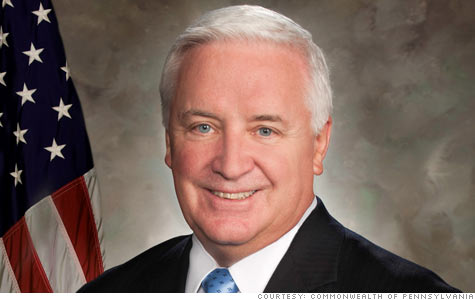JOHNSTOWN – Gov. Tom Corbett was joined yesterday by Senator Dominic Pileggi (R-Delaware) on the University of Pittsburgh at Johnstown campus to sign into law life-saving legislation that will help to reverse heroin overdoses in Pennsylvania.
At the event, Corbett also approved recommendations from a working group established in May that will improve the state’s response to the growing heroin and opoid addiction and overdose crisis.
Opioids are a commonly prescribed prescription drug that is highly addictive even when taken as prescribed. Studies have shown that approximately 80 percent of heroin users began their addiction with prescription opioids. Between 2009 and 2013, nearly 3,000 heroin-related overdose deaths were identified by county coroners in Pennsylvania.
“As a former prosecutor, I’ve seen opioid addiction and overdoses ruin people’s lives and tear families apart, which is why these actions are absolutely critical to stop the escalating opioid problem statewide,” Corbett said.
“The bill I am signing will save lives and ensure those who help someone in need aren’t punished for doing so. I applaud Senator Pileggi for his work on Senate Bill 1164.”
Senate Bill 1164 will provide legal protections for witnesses, or Good Samaritans, seeking medical help at the scene of an overdose. In addition, it allows Naloxone to be prescribed to a third party, such as a friend or family member, and administered by law enforcement and firefighters.
In May, Corbett tasked the Department of Drug and Alcohol Programs to lead a Heroin and Other Opioids Workgroup with other state agencies in order to improve the state’s response to heroin and other opioid use and overdose.
“I would like to thank Secretary Tennis, committee members and stakeholders for sharing their input during this process and for providing a comprehensive approach to a very complex problem,” Corbett said.
Corbett approved the workgroup recommendations that provide effective solutions to help address the heroin and opioid problem while efficiently using taxpayer dollars. It includes the expansion of current initiatives, collaboration between both public and private sectors and working with our state lawmakers on life-saving legislation.
The workgroup identified five categories containing a total of 13 recommendations, which include:
- Safe and Effective Use of Prescription Opioids
- Safer Prescribing Practices – Encouraging support for the Prescribing Guidelines by all health care providers and expanding education to prescribers across the state.
- Safer Dispensing Practices – Establishing a public-private partnership between the health insurance industry and the state to reduce opioid misuse and overdose.
- Reforms to Workers’ Compensation– Encourage and support legislative efforts to address unsafe and excessive prescribing practices within Workers’ Compensation.
- Prescription Drug Monitoring Program– Encourage and support legislative efforts to enact and successfully implement the Prescription Drug Monitoring Program.
- Access to Treatment
- Provider Education– Increase health care provider education and awareness regarding substance use disorders, screening and referral to treatment.
- Benefit Education– Increase education and awareness to employees and their family members about substance use disorders, including access to care through State Employee Assistance Program (SEAP) and the Pennsylvania Employees Benefit Trust Fund (PEBTF).
- Increased Access through Public-Private Partnerships– Increase public-private partnerships to address substance use disorders, such as cross-agency training to increase awareness of drug addiction, working with third-party insurers to improve awareness of treatment benefits, and addressing drug addiction in the State Healthcare Innovation Plan.
- Expansion of Restrictive Intermediate Punishment (RIP)– Expand availability of RIP treatment diversion sentences for offenders currently being sentenced to county jail or to low-level state prison sentences and explore diversion post-arrest vs. at sentencing
- Licensing: Professional Intervention
- Health-related Boards– Develop and implement an education program for health-related boards administered by the Department of State Bureau of Professional and Occupational Affairs.
- Business-related Boards– Educate and engage with the Departments of State and Labor and Industry about impacts on the workforce due to drug addiction, including loss of productivity and profits.
- Education: Prevention, Intervention and Outreach
- Evidence-based Prevention– Establish an informal, internal Executive Prevention Council to identify best practices and evidence-based substance use disorder prevention programs.
- Information Dissemination– Distribute materials about prevention and intervention of substance use disorders to employees and the general public.
- Overdose Response
- Naloxone and Good Samaritan– Support and anticipate passage of legislative efforts aimed to prevent opioid-related overdose deaths by expanding access to naloxone to family members, friends, and first responders; and by permitting limited legal protections for witnesses seeking medical help at the scene of an overdose.
“From the Department of State to PennDOT to the Office of Administration – all of our workgroup participants contributed valuable ideas and showed that addiction truly touches all aspects of state government and its services,” DDAP Secretary Gary Tennis said.
“I thank Governor Corbett for making this issue a priority and the workgroup for their dedication to finding innovative solutions to the substance abuse problem.”
“The heroin problem cannot be solved solely by law enforcement; it must be addressed by properly preventing addiction, intervening when necessary and helping individuals with addiction get the treatment they deserve,” Corbett said.
The governor also urged the legislature to pass Senate Bill 1180, which establishes a Prescription Drug Monitoring Program in Pennsylvania that will give physicians better knowledge of prescriptions written for and filled by a patient and help address the issue of “doctor shoppers.”
Corbett was joined by Pileggi and Senator John Wozniak (D-Cambria);Cambria County Commissioners Douglas Lengenfelder (R), Mark Wissinger (R) and Tom Chernisky (D); representatives from the Pennsylvania District Attorneys Association; families impacted by opioid addiction and overdoses; and members of the medical and law enforcement communities.
For more information or to view the full Heroin and Other Opioids Workgroup Recommendations, visit www.ddap.pa.gov.




